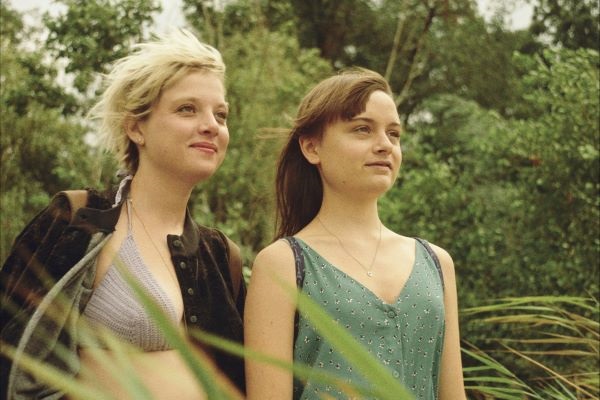Set in Berlin during the summer of 2018, 14 year old Nora (Lena Urzendowsky) is always following her older, more worldly, sister Jule (Lena Klenke) as she hangs out with her friends and tries to emulate their behaviour, but her comparative immaturity prevents her from fitting into Jule’s social circle and leaves her feeling isolated. However, when Nora meets Romy (Jella Haase), a mysterious new student, she finds that her feelings for Romy provide her with a new sense of identity that separates her from Jule.
Director Krippendorff, who also wrote the film’s script, provides an accurate insight into not only the shared lifestyle of the film’s teenage characters, which emphasises the usual elements of school, drink, drugs and sex, but also how this contrasts with Nora’s growing realisation of her own sexuality and maturity. This latter aspect can be seen in the depiction of Nora getting her period whilst in the school gym, which results in her being taunted at by her classmates, and the recurring motif of Nora looking after her pet caterpillar, with parallels drawn between its developmental cycle and her coming of age.
Krippendorff also effectively depicts how Nora, Jule, and the rest of the teenage characters navigate the complex issues of adolescence in their economically-deprived surroundings. This includes not only the intricacies of Nora’s relationship with Romy, which reveal that Romy is not averse towards heterosexual relationships, but also Jule’s attempts to keep her mother sober through looking after a baby doll given to her by her teacher. This moment in particular exposes Jule’s attempts to be mature for the overall act that it is, as the seemingly more adult older sister is shown to be just as naive as Nora. This aspect is further emphasised in a later scene where a newly-empowered Nora has to revive a paralytic Jule at a house party.
Krippendorff’s aims are impressive, but they would not be as effective if it were not for the performances of the main cast. In particular, Urzendowsky impresses as Nora, embodying her initial naivety as well as her growing realisation of her own sexuality and confusion in her interactions with Romy. In addition, Klenke effectively realises Jule’s contradictions, with her ostensible maturity giving way to a more childlike vulnerability as the narrative progresses.
Cocoon is an impressive coming-of-age story that skilfully utilises its lead performance and supporting characters to convey a teenage girl’s realisation of her own identity and sexuality in a nuanced manner. Krippendorff and her cast should receive credit for such an impressive depiction of adolescence, which avoids the usual cliches associated with this kind of narrative.
Available On-demand now. More info can be found at cocoonfilm.co.uk
